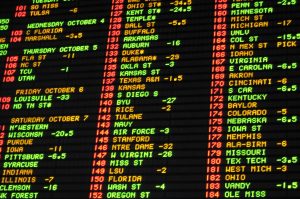 The Supreme Court, in a 6 – 3 decision, struck down the Professional and Amateur Sports Protection Act of 1992 and made legal all gambling on sporting events in the United States. This is good news for the states who want to reap the profits therein. It is more of a mixed bag for those who wish to gamble because it is certain with this broadening of gambling there will be lives destroyed. I’d like to discuss that dual nature associated with gambling and what role the government has to play in it.
The Supreme Court, in a 6 – 3 decision, struck down the Professional and Amateur Sports Protection Act of 1992 and made legal all gambling on sporting events in the United States. This is good news for the states who want to reap the profits therein. It is more of a mixed bag for those who wish to gamble because it is certain with this broadening of gambling there will be lives destroyed. I’d like to discuss that dual nature associated with gambling and what role the government has to play in it.
First, let’s examine how the bill got passed so we can dispense with blaming a particular political party. It’s an interesting case from a legal standpoint and the federal government used, as it often does, the Commerce Clause to provide legal justification for refusing to allow states to establish their own gambling guidelines.
The original bill passed through the Senate and the House of Representatives with little opposition from either party and the major professional sports leagues largely supported it. The Supreme Court has now ruled this was a violation of the Tenth Amendment power given to each state.
The Constitution is silent on gambling despite it being widespread at the time the Founding Fathers were writing the Constitution. They knew about gambling and the harmful effects therein, just as they knew about alcoholism and its damaging potential. I cannot in good conscience simply claim gambling is a victimless crime. People destroy their own lives and those of their families by leaving their estate bankrupt. People blow their children’s college funds which can and does have a major impact on their future earning, their entire lives.
Problem Betting is a terrible impulse control disorder, I’ve seen it in action on the few occasions I’ve visited casinos. The casinos here in the St. Louis area are largely not filled with happy people spending a night out with friends but with elderly and disabled people spending their disability and social security money. It is horrific to see and that’s why I largely don’t patronize casinos.
This is why politicians of both main political parties felt justified in passing the legislation that prohibited states from sports gambling. Well, they prohibited most states and most sports. Horse Racing, Dog Racing, and Jai-alai were exempted as was the state of Nevada.
Did this actually prevent people from gambling on sports? Of course not. People continue to gamble although not legally. They place wagers with bookies who are not bound by laws and regulations. Lives are destroyed despite the law. Will more lives be destroyed when gambling is made legal? It’s certainly possible.
The underlying question you must answer if you want to know if government has the right to prevent gambling is if you think people need to be protected from themselves. For a Libertarian like myself, the answer is an obvious no but the problem is more complex. People make horrible decisions and do tremendous damage to their own lives and those who care about them. Is there an obligation to help them, even if means others are prevented from doing something they enjoy?
Is my freedom to gamble worth the destruction of so many other lives? Is my freedom to drive a car at whatever speed I want if I’m very careful worth the lives that will be lost if others, less careful, do the same?
These are not easy questions to answer. I think gambling is a personal decision the government should not be involved in restricting. What do you think?
Tom Liberman
Pingback: DraftKings Sports Betting National Championship Mayhem - Tom Liberman